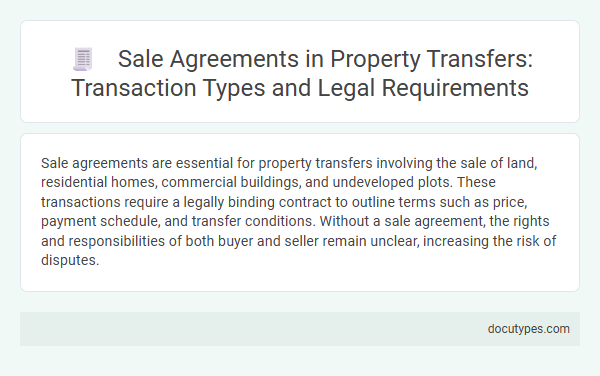Sale agreements are essential for property transfers involving the sale of land, residential homes, commercial buildings, and undeveloped plots. These transactions require a legally binding contract to outline terms such as price, payment schedule, and transfer conditions. Without a sale agreement, the rights and responsibilities of both buyer and seller remain unclear, increasing the risk of disputes.
Understanding Sale Agreements in Property Transfers
Sale agreements play a crucial role in property transfers, outlining the terms and conditions agreed upon by buyers and sellers. Understanding which transactions require a sale agreement ensures legal clarity and protects both parties involved in the property transfer process.
- Residential Property Transfers - Sale agreements are mandatory for transactions involving residential homes to ensure clear ownership and terms.
- Commercial Property Sales - Transfers of commercial real estate require detailed sale agreements to address complex terms and conditions unique to business properties.
- Vacant Land Transactions - Even undeveloped land sales require a sale agreement to specify boundaries, price, and any restrictions or easements.
Key Elements of a Property Sale Agreement
Property sale agreements are essential for transactions involving the transfer of ownership rights, including residential, commercial, and land sales. Key elements of a property sale agreement include the identification of the buyer and seller, the detailed description of the property, and the agreed purchase price. The agreement also outlines payment terms, contingencies, closing dates, and any warranties or disclosures related to the property's condition.
Types of Property Transfer Transactions
Property sale agreements are essential for various types of property transfer transactions, ensuring legal protection and clarity between parties. Common transactions that require a sale agreement include residential home sales, commercial property transfers, and land purchases.
Other transactions involving property leases with option to buy or exchange of property also necessitate a formal sale agreement. Understanding which transactions require this document helps you avoid legal complications and safeguard your interests during the transfer process.
Legal Checklist Before Drafting a Sale Agreement
What types of property transactions require a sale agreement? Sale agreements are essential for most real estate transactions involving the transfer of ownership or interest in property. These documents legally bind the buyer and seller to the terms of the transaction.
What should be on your legal checklist before drafting a sale agreement? Verify clear property title, check for any encumbrances or liens, and ensure compliance with local property laws. Confirming these details prevents future disputes and protects your investment.
Required Documentation for Sale Agreements
Sale agreements are essential in property transactions such as residential home sales, commercial property transfers, and land purchases. The required documentation for these agreements typically includes the deed, proof of ownership, identification of both parties, and detailed property descriptions. You must ensure all necessary documents are accurate to facilitate a smooth and legally binding property transfer process.
Role of Real Estate Agents and Legal Advisors
A sale agreement is essential for various property transfer transactions to ensure legal protection and clarity between parties. Real estate agents and legal advisors play a pivotal role in drafting, reviewing, and finalizing these agreements.
- Purchase and Sale Transactions - A sale agreement is mandatory for transferring ownership between a buyer and seller, clearly outlining terms and conditions.
- Lease-to-Own Agreements - Real estate agents assist in structuring agreements that convert rental agreements into property sales, ensuring compliance and transparency.
- Property Development Contracts - Legal advisors oversee agreements involving developers and buyers to protect interests and ensure regulatory adherence.
Common Clauses in Property Sale Agreements
Property sale agreements are essential for most transactions involving the transfer of real estate ownership. These agreements legally bind the buyer and seller and outline the terms of the sale.
Common clauses in property sale agreements include the purchase price, payment terms, and closing date. Contingencies such as financing approval, home inspection, and title clearance are often specified. The agreement also addresses property condition, disclosures, and remedies for breach of contract.
Registration and Stamp Duty Requirements
Sale agreements are essential in property transfers to formalize the transaction and comply with legal requirements. Proper registration and payment of stamp duty are critical steps in validating the sale agreement and ensuring the transfer is legally recognized.
- Sale of immovable property - Requires a registered sale agreement to legally transfer ownership and enable property registration.
- Lease agreements exceeding 12 months - Must be registered and may attract stamp duty to validate the lease contract.
- Agreement to sell - Needs proper documentation and registration for enforceability and to calculate applicable stamp duty.
Registration and stamp duty requirements vary by jurisdiction but are mandatory to avoid future legal disputes and confirm property ownership transfer.
Dispute Resolution in Property Sale Transactions
| Transaction Type | Sale Agreement Requirement | Impact on Dispute Resolution |
|---|---|---|
| Residential Property Sales | Mandatory sale agreement to formalize terms of sale | Clearly defines obligations and remedies, reducing potential disputes |
| Commercial Property Transfers | Essential to outline complex terms and conditions | Facilitates structured dispute resolution mechanisms like mediation or arbitration |
| Land Transactions | Required to establish boundaries, price, and conditions | Helps prevent boundary and title disputes by documenting details precisely |
| Lease-to-Own Arrangements | Sale agreement must specify transfer timeline and obligations | Clarifies timelines and responsibilities, minimizing lease-related conflicts |
| Inherited Property Sales | Recommended to confirm rightful ownership and terms | Prevents disputes stemming from contested claims and unclear title |
Using a clear and comprehensive sale agreement in your property transactions ensures that both parties understand their rights and obligations, greatly aiding in effective dispute resolution if conflicts arise.
What Types of Transactions Require a Sale Agreement in Property Transfers? Infographic

